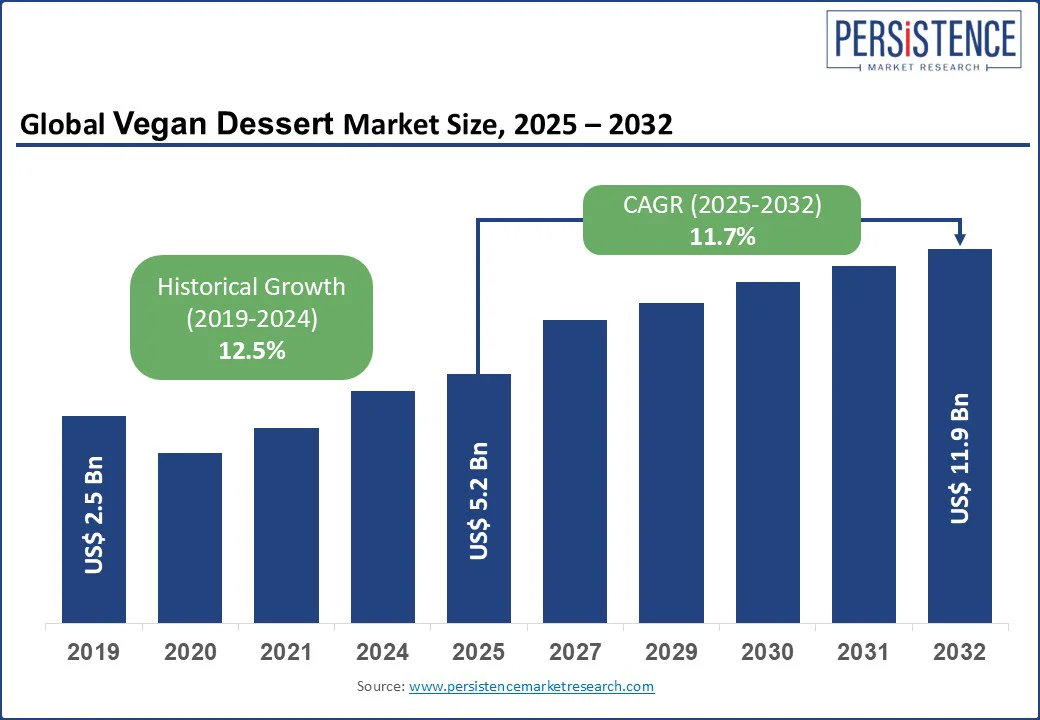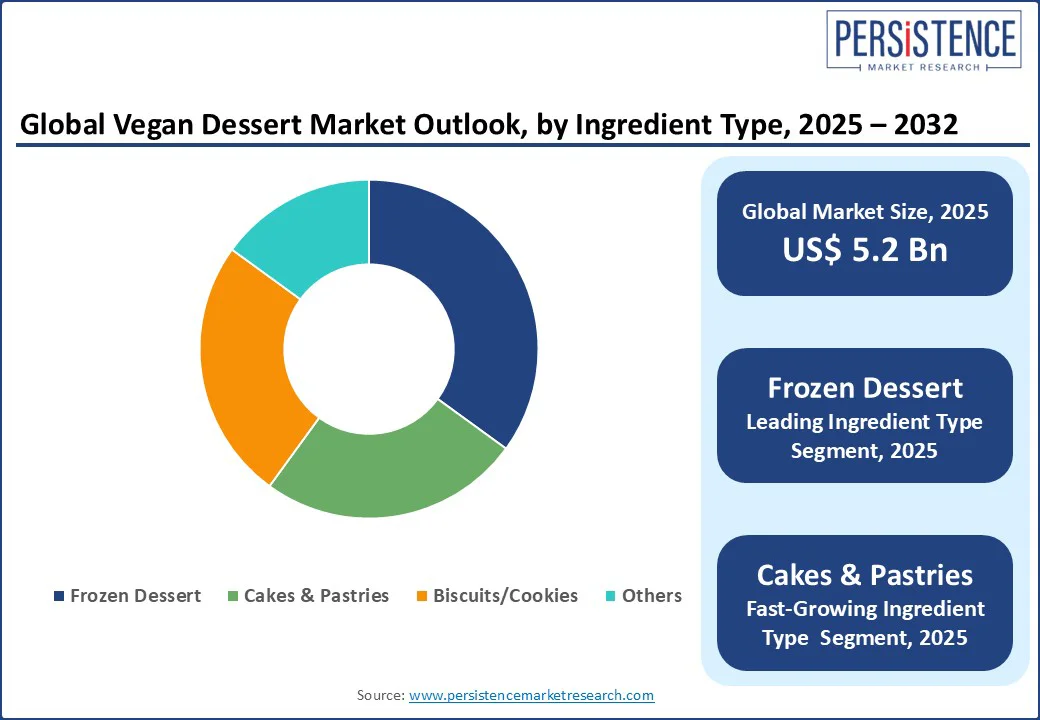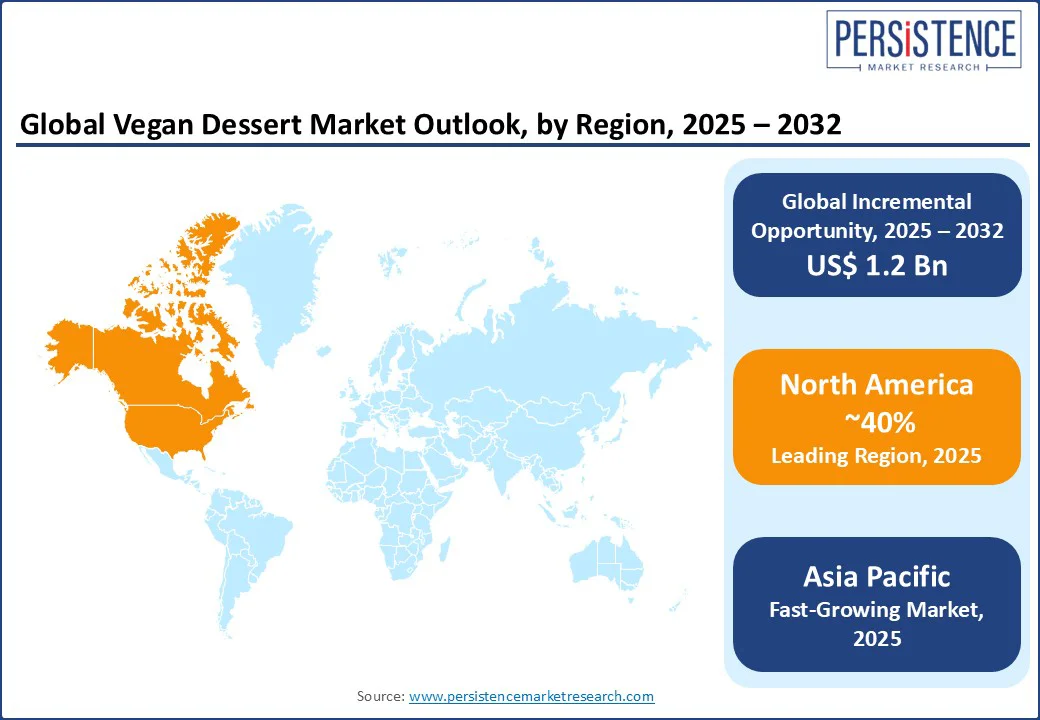ID: PMRREP31913| 175 Pages | 24 Aug 2025 | Format: PDF, Excel, PPT* | Food and Beverages

The global vegan dessert market size is likely to be valued at US$ 5.2 Bn in 2025 and is expected to reach US$ 11.9 Bn by 2032, achieving a CAGR of 11.7% during the forecast period 2025 - 2032.
The vegan dessert industry is experiencing strong growth, driven by rising consumer demand for plant-based, dairy-free, and healthier alternatives. Products such as frozen desserts, cakes, pastries, and sweet treats are gaining popularity among health-conscious, ethical, and environmentally aware consumers. A growing number of people are adopting vegan or flexitarian diets due to animal welfare and environmental concerns. Eco-friendly packaging and sustainable sourcing enhance consumer appeal and drive adoption.
Key Industry Highlights:

|
Global Market Attribute |
Key Insights |
|
Vegan Dessert Market Size (2025E) |
US$ 5.2 Bn |
|
Market Value Forecast (2032F) |
US$ 11.9 Bn |
|
Projected Growth (CAGR 2025 to 2032) |
11.7% |
|
Historical Market Growth (CAGR 2019 to 2024) |
15.8% |
The vegan dessert market is propelled by several key factors, with a significant focus on the rising vegan population and health-conscious consumer trends, driving demand for dairy-free sweets, vegan cakes, and egg-free desserts.
The global vegan population reached 79 Mn in 2025, increasing demand for vegan baked goods, plant-powered desserts, and dairy-free and gluten-free dessert products. A 2025 survey noted that 60% of consumers prioritize healthy desserts for dietary needs, boosting vegan cookies and vegan cheesecakes by 15%.
The rise in plant-based diets, with 30% of global consumers adopting flexitarian or vegan lifestyles, fuels demand for plant-based pudding and vegan confectionery, with 20% growth in the organic vegan dessert market trends and growth. Sustainable desserts, using plant-based sweeteners and gluten-free flour, grew by 18%, driven by eco-conscious consumers.
The global dessert market, valued at US$400 Bn in 2025, supports dairy-free indulgence and vegan dessert alternatives to traditional sweets, with 50% of new dessert launches incorporating innovative vegan desserts for foodservice and retail, as well as vegan chocolates.
High production costs and limited consumer awareness pose significant restraints to the vegan dessert market, impacting the adoption of vegan baked goods and confectionery. The cost of premium ingredients such as vegan chocolates and plant-based sweeteners increased by 15% in 2025, affecting dairy-free sweets.
In emerging markets, 40% of consumers lack awareness of vegan dessert alternatives to traditional sweets, limiting demand for vegan cakes and plant-powered desserts. Regulatory compliance for dairy-free and gluten-free dessert products, such as allergen-free certifications, raised production costs by 12%, challenging vegan cookies and vegan cheesecakes.
Additionally, taste perception issues, with 20% of consumers preferring traditional desserts, restrict the penetration of plant-based pudding and sustainable desserts in regions such as the Middle East and parts of Africa, constraining premium vegan dessert brands.
The rise of organic vegan dessert market trends and growth, and e-commerce channels presents significant opportunities for the vegan dessert market. The global organic food market is projected to grow at a CAGR of 10% through 2032, increasing demand for sustainable desserts and dairy-free indulgence using gluten-free flour and vegan chocolates.
A 2025 report noted that 25% of new dessert launches incorporate innovative vegan desserts for foodservice and retail, boosting vegan confectionery by 20%. Online retailers, with 30% growth in vegan dessert alternatives to traditional sweets, enhance accessibility for vegan cookies and plant-based pudding.
Companies such as Unilever are investing US$150 Mn in R&D for healthy desserts and premium vegan dessert brands, targeting HoReCa and supermarkets. Emerging markets with 2 Bn health-conscious consumers by 2030, offer opportunities for vegan cakes and plant-powered desserts, positioning vegan dessert recipes and innovations as a key growth driver.
Frozen Desserts hold approximately 35% of the market share in 2025 due to their popularity in dairy-free sweets. These products, which include items like vegan ice creams, sorbets, and frozen yogurts, cater to the rising number of lactose-intolerant, vegan, and health-conscious consumers. Their popularity is particularly high in supermarkets, which account for half of the adoption rate in 2025, as they offer wide accessibility and convenience to shoppers.
Cakes & Pastries are driven by vegan cakes and vegan cheesecakes, with 15% growth in 2025. Consumers are increasingly seeking indulgent desserts that align with ethical, environmental, and health-conscious choices. This trend is particularly visible in bakery sections of supermarkets and specialty vegan stores, where these products are gaining traction.
Dairy-Free Milk commands a 40% market share in 2025, driven by plant-powered desserts, with 55% adoption in 2025. Consumers are increasingly seeking lactose-free, vegan, and healthier alternatives, making dairy-free milk a preferred base ingredient. Innovations in almond, oat, soy, and coconut milk varieties, often fortified with vitamins and minerals, have enhanced taste, texture, and nutritional appeal.
Plant-based Sweeteners are fueled by healthy desserts, with 18% growth in 2025. These natural sweeteners, derived from stevia, monk fruit, agave, and other plant sources, appeal to consumers who want indulgent desserts without the added sugar or calories. Manufacturers are integrating these sweeteners into cakes, pastries, frozen desserts, and beverages, ensuring products remain flavorful while aligning with health-conscious trends.
Supermarkets hold a 45% market share in 2025, driven by vegan baked goods, with 50% adoption. Their popularity is driven by the convenience, variety, and accessibility they offer to consumers seeking plant-based options. Vegan cakes, pastries, and other baked goods are increasingly stocked alongside traditional products, making it easier for shoppers to explore healthier and ethical alternatives.
Online Retailers are fueled by vegan dessert alternatives to traditional sweets, with 20% growth in 2025. E-commerce platforms provide a wide selection of plant-based desserts, including frozen treats, cakes, and snack options, often unavailable in local stores. Consumers increasingly value the ability to explore niche vegan brands, compare ingredients, and access allergen-friendly options online.

In North America, the Vegan Dessert Market holds a prominent position, commanding a 40% market share in 2025. The U.S. dominates due to its strong vegan and health-conscious consumer base, with US$ 2 Bn in vegan dessert sales in 2025. The U.S. market is driven by dairy-free sweets and vegan cakes, with 70% of vegan consumers using vegan confectionery in 2025.
Organic vegan dessert market trends and growth grew by 15%, supported by Ben & Jerry's Homemade, Inc. Vegan dessert recipes and innovations see 12% growth, aligning with health trends. HP Hood LLC (Planet Oat) and Unilever drive 25% of regional revenue, leveraging dairy-free indulgence.
In Europe, the vegan dessert market accounts for a 30% market share, led by Germany, the UK, and France. Germany’s market grows at a CAGR of 11.6%, driven by vegan baked goods and healthy desserts, with 60% of retailers stocking vegan cookies in 2025. The UK’s plant-powered desserts support with vegan cheesecakes adopted by Tesco.
France’s sustainable desserts drive 12% growth in vegan confectionery. EU sustainability regulations boost 15% growth in dairy-free and gluten-free dessert products, with €100 Mn in funding for vegan food innovation in 2025 enhancing plant-based pudding. Danone S.A. leads with 10% market share.
Asia Pacific is the most prominently growing region, with a CAGR of 12.8%, led by China, India, and Japan. China holds a 40% regional market share, driven by a 25% increase in vegan consumers in 2025, boosting vegan cakes and vegan dessert alternatives to traditional sweets.
India’s market is fueled by plant-powered desserts and vegan cookies, with 85% of urban retailers stocking dairy-free sweets in 2025. Japan’s vegan confectionery drives 15% growth in healthy desserts. Grupo Bimbo and OGGS lead, supported by US$ 10 billion in vegan food investments by 2030.

The global vegan dessert market is highly competitive, with food companies competing on innovation, health focus, and sustainability. HP Hood LLC (Planet Oat) and Unilever dominate in dairy-free sweets, while Danone S.A. leads in vegan baked goods. Innovative vegan desserts for foodservice and retail, sustainable desserts, and premium vegan dessert brands add a competitive layer.
Strategic partnerships and R&D investments in vegan dessert recipes and innovations are key differentiators. These strategies not only enhance brand recognition but also create barriers for new entrants, positioning innovation and sustainability as key competitive differentiators in the evolving vegan dessert market.
The vegan dessert market is projected to reach US$ 5.2 Bn in 2025, driven by dairy-free sweets and vegan cakes.
Rising veganism, healthy desserts, and innovative vegan desserts for foodservice and retail are key drivers.
The vegan dessert market grows at a CAGR of 11.7% from 2025 to 2032, reaching US$ 11.9 Bn by 2032.
Opportunities include organic vegan dessert market trends and growth, sustainable desserts, and online retailers.
Key players include HP Hood LLC (Planet Oat), Unilever, Danone S.A., Ben & Jerry's Homemade, Inc., and Grupo Bimbo.
|
Report Attribute |
Details |
|
Historical Data/Actuals |
2019 - 2024 |
|
Forecast Period |
2025 - 2032 |
|
Market Analysis Units |
Value: US$ Bn, Volume: As Applicable |
|
Geographical Coverage |
|
|
Segmental Coverage |
|
|
Competitive Analysis |
|
|
Report Highlights |
|
|
Customization and Pricing |
Available upon request |
By Product Type
By Ingredient Type
By Distribution Channel
By Region
Delivery Timelines
For more information on this report and its delivery timelines please get in touch with our sales team.
About Author